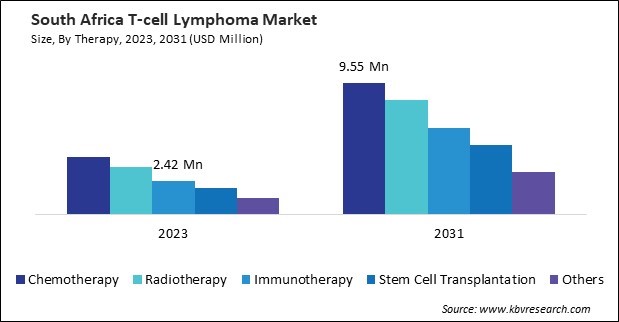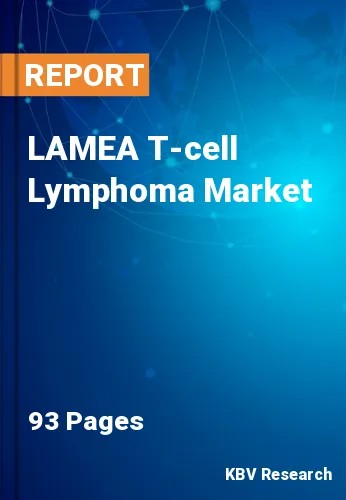The Latin America, Middle East and Africa T-cell Lymphoma Market would witness market growth of 11.3% CAGR during the forecast period (2024-2031).
The Brazil market dominated the LAMEA T-cell Lymphoma Market by Country in 2023, and would continue to be a dominant market till 2031; thereby, achieving a market value of $75.9 million by 2031. The Argentina market is showcasing a CAGR of 12.2% during (2024 - 2031). Additionally, The UAE market would register a CAGR of 10.9% during (2024 - 2031).

Oncologists and hematologists specializing in lymphoma play a pivotal role in adoption. Their familiarity with emerging therapies, comfort with new treatment paradigms, and access to continuing medical education influence adoption rates. The heterogeneity of these lymphomas necessitates personalized treatment approaches. Adoption rates are influenced by patient-specific factors such as disease subtype, stage, molecular profile, comorbidities, and treatment goals aligned with patient preferences.
The availability and accessibility of advanced diagnostic technologies, including molecular profiling, PET-CT imaging, and biomarker testing, impact treatment decisions and the adoption of targeted therapies tailored to individual patient needs. The availability of comprehensive cancer centers, specialized clinics, and multidisciplinary care teams capable of delivering complex therapies and supportive care influences adoption rates. Healthcare infrastructure development in underserved regions is crucial for equitable access to innovative treatments.
The UAE's healthcare expansion positions it as a leading destination for medical tourism, with specialized oncology centers and hospitals attracting international patients seeking advanced treatments for these lymphomas. This influx of international patients contributes to the local healthcare economy and fosters collaborations with global healthcare providers. According to the International Trade Administration (ITA), in the UAE's 2022 federal budget, a total of USD 15.8 billion (AED 58.931 billion) was approved for public spending, of which 8.4% is dedicated to healthcare. Additionally, UAE's Vision 2040 has healthcare as a priority sector for the UAE government, and the country will continue to be an attractive location for establishing a regional distribution center for healthcare services. Investments in healthcare infrastructure in the UAE result in state-of-the-art oncology facilities equipped with the latest diagnostic technologies and treatment modalities for these lymphomas. This includes proton therapy, robotic surgery, and personalized medicine approaches that enhance treatment precision and patient outcomes. Therefore, increasing ageing population and rising healthcare sector budget in the region is driving the growth of the market.
Free Valuable Insights: The Worldwide T-cell Lymphoma Market is Projected to reach USD 3.7 Billion by 2031, at a CAGR of 8.5%
Based on Type, the market is segmented into Peripheral (Cutaneous T-cell Lymphoma, Anaplastic Large Cell Lymphoma, Angio-immuno-blastic T-cell Lymphoma, and Others) and Lymphoblastic. Based on Therapy, the market is segmented into Chemotherapy, Radiotherapy, Immunotherapy, Stem Cell Transplantation, and Others.Based on countries, the market is segmented into Brazil, Argentina, UAE, Saudi Arabia, South Africa, Nigeria, and Rest of LAMEA.
By Type
By Therapy
By Country
Our team of dedicated experts can provide you with attractive expansion opportunities for your business.

